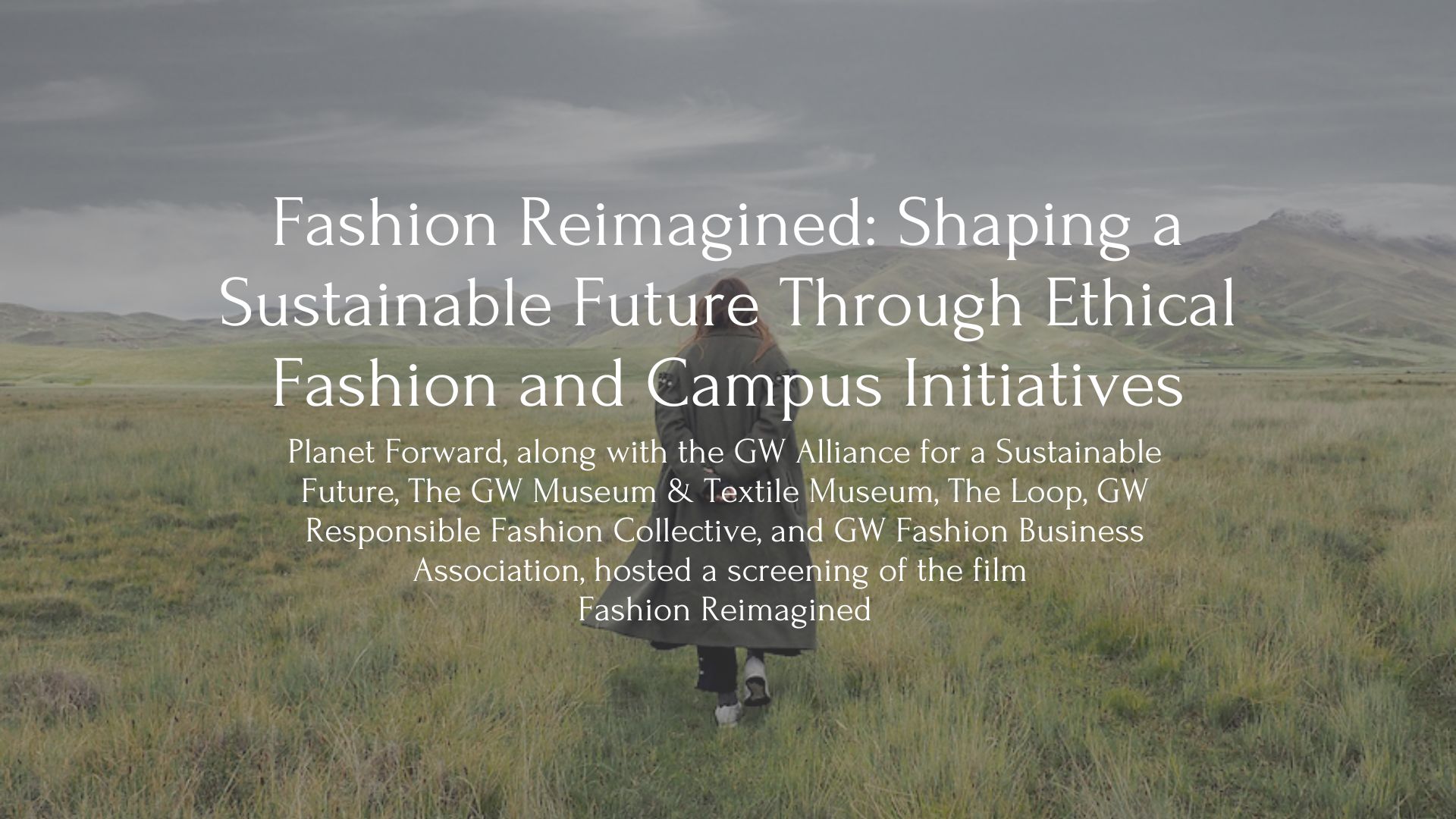On Thursday, October 24th, Planet Forward, along with the GW Alliance for a Sustainable Future, The GW Museum & Textile Museum, The Loop, GW Responsible Fashion Collective, and GW Fashion Business Association, hosted a screening of the film Fashion Reimagined.
Fashion Reimagined is a 2022 documentary that tracks the journey of the sustainable fashion brand Mother of Pearl and its creative director, Amy Powney, as they work to transform the fashion industry from within. Mother of Pearl, a British brand, has long been known for its stylish, high-quality clothing, but Fashion Reimagined highlights Powney's journey to turn her creative vision into a force for sustainability.
The film follows Powney and Mother of Pearl’s Head of Production, Chloe Marks, as they embark on a mission to make Powney’s new fashion line using a completely trackable supply chain that is more environmentally friendly. Powney and Marks had to build a completely sustainable supply chain from the ground up, since this chain did not exist when the project began. They started from the raw materials, like wool and cotton, to the production of thread and cloth, and then the distribution of the finished clothing. Their goal was not just to create sustainable garments but also to challenge the norms of the industry as a whole. Through the film, Powney highlights the often-overlooked environmental and social costs of fast fashion. The documentary sheds light on the harmful effects of traditional clothing manufacturing, such as pollution, water waste, and the exploitation of labor. Marks’ focus on the practical side of implementing Poweny’s ideals allows them to identify and overcome the barriers that came with creating an ethical and environmentally sound fashion line.
In the end, Powney and Marks’ journey not only helped establish a supply chain for Mother of Pearl that upheld these values, but also paved the way for other brands to see the possibilities of sustainable sourcing in fashion. Her work in navigating this uncharted territory has contributed significantly to pushing the fashion industry toward a future where sustainability is achievable and impactful, influencing a broader movement toward slow, ethical fashion.
Following the screening, a discussion panel was held, bringing together experts and students to discuss sustainable fashion and its challenges. The panel was moderated by GW student and Planet Forward intern, Dre Pedemonte, and featured Katrina Orsini from the GW Museum and Textile Museum, Alex Marootian, a senior at GW and e-board member of the Fashion and Business Association, Sofia Tija, a junior and intern at GW’s Office of Sustainability, and Niharika Sen, also a sustainability intern and President of the Responsible Fashion Collective (RFC).
Each panelist was able to offer unique insights from their varying backgrounds and experiences, which started with them each defining what sustainable fashion actually is. Sen explained that the term “responsible” might better reflect the movement rather than "sustainable," especially within a consumer-driven system. She argued that true sustainability is about making conscious decisions regarding purchasing and understanding the journey of each clothing item from its origin to its environmental impact. Sofia Tija introduced GW’s The Loop, a campus-based initiative where donated clothes are distributed to students for free. By promoting secondhand fashion, The Loop encourages students to cut back on new purchases and reuse clothing, reducing waste and building versatile wardrobes.
Orsini highlighted how fast fashion culture has pushed people away from repeating outfits, largely due to social media and celebrity influence. She explained that the average garment is only worn about seven times before it is discarded, a turnover rate that does not align with the environmental cost of production. Marootian shared insights from his work with George, GW’s fashion publication, suggesting that many students draw inspiration for fashion from historical and repeating trends, and by buying second-hand, you can avoid falling into the fast fashion cycle.
When discussing the impact The Loop has had on campus since its launch in late August, Sofia Tija shared that they have hosted 15 pop-ups on the Mount Vernon campus on Fridays this semester. She also noted that they have diverted over 2,000 items from ending up in landfills and that students are enthusiastic about the welcoming community space that The Loop has provided.
In discussing “guilt-free” fashion, Sen broke down her approach to shopping with six questions that encourage a comprehensive and mindful perspective on each purchase. Starting with What, she recommends considering which garments are genuinely needed and how versatile they are, like choosing a dress that can serve both formal and casual purposes. Moving on to Who, she highlighted the importance of acknowledging the people who make the clothing, urging consumers to support brands that pay fair wages. Where the item is sourced matters as well; buying from local businesses reduces the environmental impact of transportation. When to buy also curbs impulsive shopping. Sen suggested delaying purchases when possible to allow time for thoughtful consideration and research. The Why behind each purchase can reveal if the item is worth the investment, further helping to reduce waste. Sen’s framework empowers consumers to be mindful and shift away from fast fashion and answers the question of How to eliminate guilt.
The screening of Fashion Reimagined and the ensuing panel discussion illuminated both the complexities and possibilities within the sustainable fashion movement. Amy Powney and Chloe Marks’ work with Mother of Pearl serves as a powerful example of how a fashion brand can reshape its entire process to prioritize environmental and ethical integrity. Their journey underscores the challenges of establishing a sustainable supply chain in an industry often defined by conveniences and cost-cutting practices, providing other brands with a blueprint for taking responsibility for their fashion footprint. The panel discussion showcased how GW initiatives like The Loop and organizations like the Responsible Fashion Collective and Fashion Business Association can foster dialogue, community involvement, and actionable change on our campus. By rethinking fashion through the lens of responsibility over mere sustainability, the panelists highlighted how individuals can collectively drive a more mindful industry.


